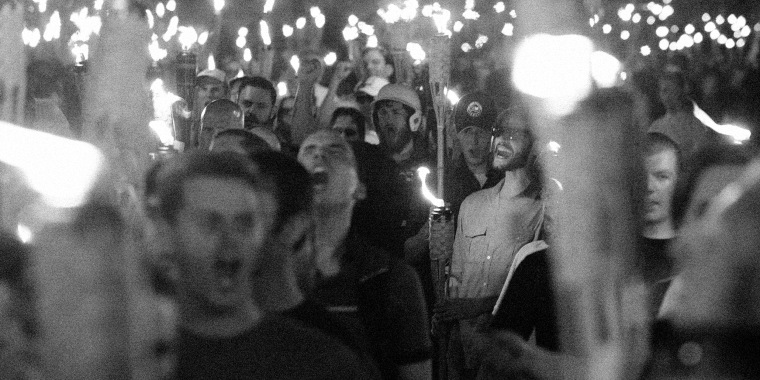Monday marked the start of a civil trial involving several of the white supremacists who helped organize the deadly “Unite the Right” rally in Charlottesville, Virginia, in 2017. The case and its invocation of a Civil War-era law will be a test of whether violent extremism can truly be curbed by civil litigation.
The rally had been billed as a protest against the city’s plans to remove a statue of Confederate Gen. Robert E. Lee from a public park, and it culminated in the murder of counterprotester Heather Heyer.
The civil suit's nine plaintiffs — which include a friend of Heyer and an undergraduate at the University of Virginia — are seeking damages from 14 individuals and 10 organizations connected to the rally. The defendants illegally conspired to incite racial violence, which resulted in the plaintiffs’ physical injuries, emotional distress and lost income, according to a complaint filed by the nonprofit civil rights group Integrity First for America.
James Fields Jr., who was convicted in 2018 of murdering Heyer by plowing his car into her and other counterprotesters, is among the defendants in the civil case. Some of the other defendants are well-known white nationalists connected to the rally, including Richard Spencer, “crying Nazi” Christopher Cantwell and the rally’s main organizer, Jason Kessler.

The plaintiffs’ lawyers are staking their case on the Ku Klux Klan Act, a 150-year-old law that sought to protect emancipated Black people from being terrorized by the Klan. It was written with explicit knowledge that some individuals and groups engage in hateful acts of violent vigilantism that have historically been met with little to no criminal punishment.
The law has been cited in at least one lawsuit against organizers and associates tied to the Jan. 6 attack on the U.S. Capitol. Earlier this year, Democratic Rep. Bennie Thompson of Mississippi and the NAACP cited the Ku Klux Klan Act in their suit alleging that then-President Donald Trump and longtime Trump associate Rudy Giuliani worked with the Proud Boys and the Oath Keepers — two far-right extremist groups — to stop the 2020 election certification process by employing intimidation, harassment and threats.
These two cases and their use of the KKK Act serve as a reminder to racist extremists that they could be subject to civil lawsuits — not just criminal prosecution — should they let their violent fantasies play out. Let’s hope they’re deterred.
Related posts:
You should be terrified — and excited — about Facebook’s metaverse plans
Congress gave minority farmers much-needed relief. White farmers say it's illegal.
Greg Abbott is trying to make Texas into a pro-Trump dystopia
Head over to The ReidOut Blog for more.
